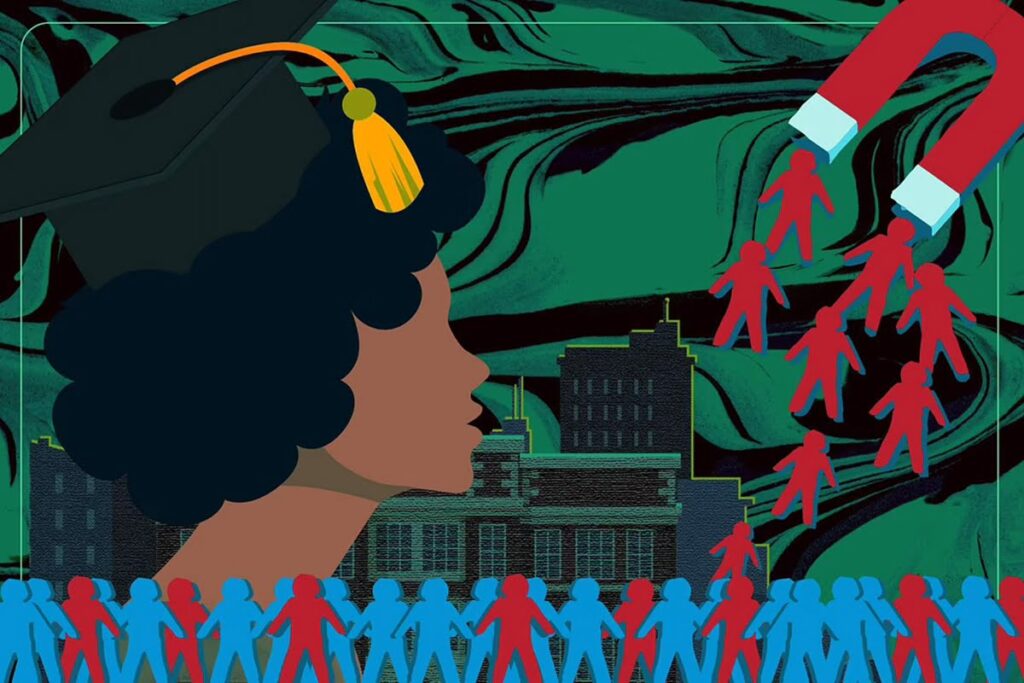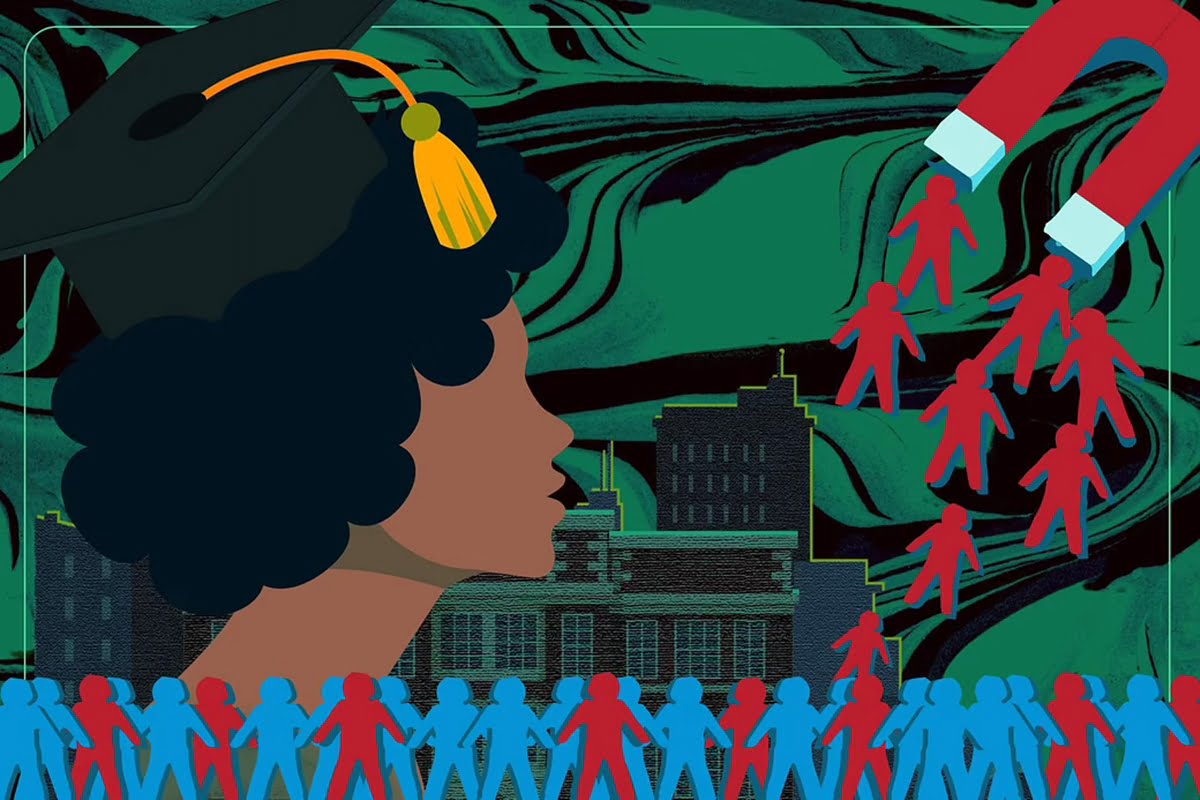
Favouritism[i] is undoubtedly a work that runs into our emotions – where we like somebody/someone over others; it exists in our choices, sometimes stated and other times followed subconsciously. But what do we do when it harms others and makes them feel doubts, hatred towards themselves, and broken beyond mending.
Once, my friend[ii] told me, “You can’t ask to be liked by your supervisor!” She told me that when she was waiting for her PhD results. If anything happened that day, my unquestioning self was already taken by some sadness, and I couldn’t agree more with her. I never wanted to be loved, but I believe I wanted to be liked – evermore in the academic journey, where I put my effort to work, to learn, to write and someday, to teach! But in my journey, I have also realised how academia functions on an everyday basis and how it generates cultural capital for few who belong to privileged caste culture. Those who follow established “knowledge” and follow the mainstream narratives of ‘oppression’ and generate such learnings in their work are appreciated. They gain more attention in the circle and acquire more success. But what about the students trying to make sense of their learnings? The learning – leading to the gradual death of the “ideas and work” of avarna students struggling to articulate it, and their ‘becoming’ is again set them to face the turbulence of isolation (Odile & Ferry, 2017).
Based on my observations, I plan to share my experience and examine two critical events: attending a week-long workshop[iii] in the southern part of India and a two-day international seminar[iv] abroad. For a PhD student, there is a complete life between coursework and submission of PhD work – attending conferences and workshops, preparing reports for the Advisory Committee, and writing for Publications/Scholarships, besides her main writing job. This stage in between decides whether students should grow or leave the battle for less! The number of Scheduled Castes (SC), and Scheduled Tribes (ST) students is growing more than ever in the drop-out lists, brought out in Lok Sabha on 4th December 2023, of five years of 13,500 students from Other Backward Classes (OBC), Scheduled Castes (SC), and Scheduled Tribes (ST) backgrounds[v]. Within my small friend circle, more than five students from different prime universities left their PhDs. It hurts me every time I hear that even after doing well in coursework, they gradually fall into the trap of being “not liked” by their supervisors anymore. Choosing between self-doubt and trying to get out of toxicity around, their struggle remains the same.
In the former event, a workshop on ‘history and memory’ in the discussion, I pointed out that a student celebrating the “labour of the oppressed,” was taking most of the other panellists’ time (including mine). Soon, our discussion got heated as I was explaining the demerit of celebrating labour and the hard work of the oppressed when we don’t talk about sharing resources with them. It sanctioned an oppressive system that do injustice to human capacity and well-being, and more so to the marginalised without any kind of resources and ownership.
The faculties attending the conference soon stopped us. However, the attitude of the faculties was highly apologetic and soft, as one of the organising team stood up and started validating her points. The faculty in turn validated this at the end and showed how she was correct in a very fathomable way. I could sense her sudden dislike for me when I began talking from a marginalised position. The student started discussing again on the same line and made her point of “owning” it, and it left me muted. A certain sense of non-belonging hit me! The faculty’s defence of the student was unnecessary, it was one-sided to help the privileged students. This is certainly what happens inside our classrooms where teachers celebrate such students over other students who are first/second generation learners from marginalised backgrounds ignoring the dynamic of students’ groupism.
In a way, the student and faculty complimented each other in rejecting my point and pushed me to stop. It is not a coincidence, but this is how the tradition of learning passed from the “learned generation” to the new without any change in their attitudes. Extending to the outside of the same processes persists. Some are helped to build students’ careers from privileged backgrounds to flourish, keeping the circle of “knowers” intact. The second event was the two-day conference on South Asia, where various papers were discussed to understand the literary and non-literary works and means of representing those communities. This time, I was not shocked by the insensitive attitude of the organising head, who commented on a student who broke down when sharing her difficulties in Academia. The senior faculty said publicly, “Better to find a language than showing emotion”! This comment arose after a presenter presented her paper, ‘on local deities of Dalits in Kerala, and while discussing the paper’s methodology, shared her difficulties in retrieving oral narratives. One of her friends in that room also started sharing her problems collecting local histories in her field. She burst into tears when she pointed out how she faced harsh and sometimes unnecessary comments from her peers and teachers (primarily privileged folks) when she wanted to bring complex narratives. She shared that this kind of experience (when putting their words into her mouth) dismisses her chance to articulate.
In both cases, a privileged narrative gets the limelight in the circle, which justifies the pleasant presence and acquaintances vs. students from the marginalised who get pushed away from the knowledge production process. Though the tyranny of merit exists worldwide it has more than its equal share of class and gender disparity (Sandel, 2020). In India, caste equality remains a tool of political correctness in the public sense. The affective and everyday experiential significance of caste is ignored. What is often dismissed by ‘favouritism’ leads to attaining a maintenance of hegemony which never challenges the prevailing attitude and celebrates the rationality of the few covering up the social networking. It overshadows the experiences of the “other” in Indian Academia, and even among teachers who teach feminism in the classroom, who otherwise teach me to value even the most odd-out.
I am trying to argue that this kind of behaviour is not new; surely some students always get support and help from their teachers and benefit even from their teacher’s circle just based on good-mouthing. This is how ‘favouritism’ works, and it never becomes a site of query as to how and why it still exists only for a few while the other gets discouraged at the same time by its negative implications of indifference. Studies have been done on the sociology of success in Academia (Bagilhole & Goode, 2001), In India, there is constant pressure on students to show their hard work and dedication. The burden on marginalised students to belong in Academia is immense and they are pushed into a state of self-loathing. The faculty who openly showed such kindness to the students who were ‘romanticising the labour’ holds a senior position in a university in Delhi, and recently, one of her PhD students from a Bahujan background quit her course. When she shared this with me about her degrading journey in PhD, who completed her coursework and passed her synopsis within one year, she shared that her difficulties started during the pandemic when the virus hit her. She said she informed her supervisor. The teacher didn’t bother contacting her but when they did connect again, she asked about her work. Maybe we should ask what is that, which does not bother the few and why so?
References:
Bagilhole, B., & Goode, J. (2001). The Contradiction of The Myth of Individual Merit, And the Reality of a Patriarchal Support System in Academic Careers: A Feminist Investigation. European Journal of Women’s Studies, 161-180.
hooks, b. (2014). Teaching to Transgress. Routledge.
Odile, H., & Ferry, M. (2017, March 22). When Cracking the JEE is not Enough. South Asia Multidisciplinary Academic Journal. doi:https://doi.org/10.4000/samaj.4291
Sandel, M. J. (2020). The Tyranny of Merit: What’s Become of the Common Good? UK: Penguin.
Sukumar, N. (2023). Teaching Dalit Bahujan Utopias: Notes from the Classroom. CASTE: A Global Journal on Social Exclusion, 4(2), 306–318. https://www.jstor.org/stable/48749131
[i] Oxford dictionary describes favouritism (noun) isthe act of unfairly treating one person better than others because you like them better. Interestingly, the word hold ethical concern. See, favouritism noun – Definition, pictures, pronunciation and usage notes | Oxford Advanced Learner’s Dictionary at OxfordLearnersDictionaries.com
[ii] I have kept her name anonymised, though I would like to mention her social location which is Savarna-higher middle class who is sensitised enough to understand the common emotions we were going through…sharing her difficulties with her supervisor.
[iii] Six-days’ workshop happened in October 2022.
[iv] The conference happened in April 2023.
[v] For more details, to see how the reason is diverted by the Minister of State for Education. Over 13.5K SC, ST, OBC students dropped out of Central universities, IITs, IIMs in past 5 years: Education Ministry – The Hindu

Thank you for highlighting the relationship between structural inequalities and the micro-aggressions that PhD students from marginalized communities face in day-to-day academic interactions. We need to hear more about these issues.